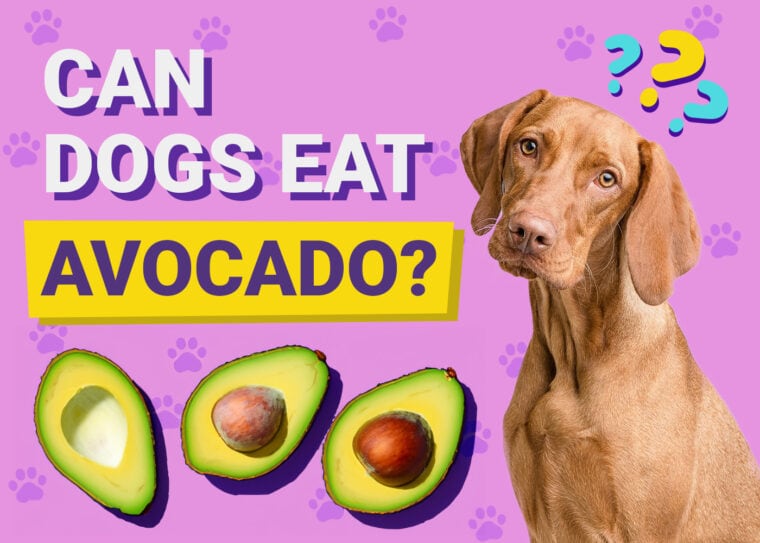
If you spend any time in dog groups on social media, then you’ve definitely seen videos of people making aesthetically pleasing and brightly colored meals for their dogs. These meals usually contain a wide variety of meats, fruits, vegetables, and supplements, and it’s not uncommon to see people add a slice of avocado to the meal.
While only one case report exists detailing two dogs developing a heart problem after avocado ingestion, avocado should be considered mildly toxic to dogs, and it’s advised not to feed it to dogs. Here’s what you need to know.
Are Avocados Dangerous for Dogs?
Here’s the thing about dogs and avocados: dogs are relatively resistant to the toxic effects of avocados, but that doesn’t mean they’re a safe food for them. Although the reports of avocado toxicosis in dogs are very limited, many other species show an extreme sensitivity to avocados, including many species of birds, rodents, cows, horses, goats, and even fish.
What Makes Avocados Toxic?
The toxic compound present in avocados is called persin. In many species, there are negative and life-threatening effects that can be seen with the consumption of avocados. All parts of the avocado plant, including all parts of the fruit, stems, seeds, and leaves have shown toxicity potential. The leaves seem to have the highest levels of persin.

What Are the Signs of Avocado Toxicosis?
There are multiple things that can occur with avocado ingestion, and this depends on the species and possibly whether the animal is lactating or not. Myocardial necrosis has been documented in some species, particularly those that are not lactating, which is the death of the tissues of the heart, which can lead to heart failure and death.
Mastitis in lactating mammals, which is an inflammation of the mammary tissues, is well documented. Hemorrhage of the mammary tissues have also been documented. Large mammary lesions and curdling of the milk can occur. In birds, feather pulling, agitation, difficulty breathing, loss of appetite, edema, and death have been seen. In some cases, the signs of avocado toxicosis can occur within 24 hours of consumption.
For animals that develop heart failure as a consequence of avocado ingestion, there are many signs that indicate the heart is no longer functioning properly, these include:
What Should I Do if My Dog Eats Avocado?
Although the risk of avocado toxicosis in dogs is low, it’s best to avoid intentionally feeding this food to your dog. On top of toxicosis, avocado pits also pose an intestinal obstruction risk, and the high fat content can lead to complicated conditions such as pancreatitis.
If your dog manages to eat part of or all of an avocado, then you should contact a pet poison control hotline or your veterinarian for further guidance. The treatment for most of the signs of avocado toxicosis is supportive, not curative, so it’s important to discuss this with your vet as soon as possible after consumption. If your dog has swallowed all of, or part of an avocado pit, it must be seen at your veterinary practice as an emergency.

In Conclusion
Small amounts of avocado flesh are unlikely to be a problem for most dogs, but the risks far outweigh the health benefits of this fruit. There’s no way of knowing if your dog is sensitive to the persin toxin in avocados without your dog experiencing avocado toxicosis, which is why it is best to avoid letting dogs eat it at all. This includes all parts of the plant, so make sure to keep your avocado trees well out of the reach of your pets.
Related Reads:
- Can Dogs Eat Papaya? Vet-Reviewed Facts & Safety Guide
- Can Dogs Eat Acorns? Vet-Reviewed Facts & Safety Guide






